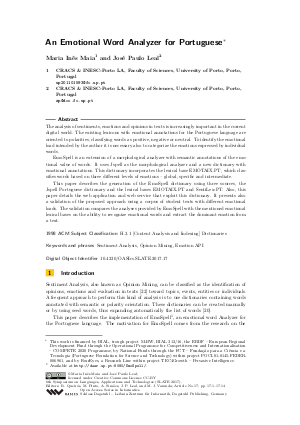An Emotional Word Analyzer for Portuguese
Authors Maria Inês Maia, José Paulo Leal
-
Part of:
Volume:
6th Symposium on Languages, Applications and Technologies (SLATE 2017)
Part of: Series: Open Access Series in Informatics (OASIcs)
Part of: Conference: Symposium on Languages, Applications and Technologies (SLATE) - License:
 Creative Commons Attribution 3.0 Unported license
Creative Commons Attribution 3.0 Unported license
- Publication Date: 2017-10-04
File

PDF
OASIcs.SLATE.2017.17.pdf
- Filesize: 2.62 MB
- 14 pages
Document Identifiers
Subject Classification
Keywords
- Sentiment Analysis
- Opinion Mining
- Emotion API
Metrics
- Access Statistics
-
Total Accesses (updated on a weekly basis)
0PDF Downloads0Metadata Views
Abstract
The analysis of sentiments, emotions and opinions in texts is increasingly important in the current digital world. The existing lexicons with emotional annotations for the Portuguese language are oriented to polarities, classifying words as positive, negative or neutral. To identify the emotional load intended by the author it is necessary also to categorize the emotions expressed by individual words. EmoSpell is an extension of a morphological analyzer with semantic annotations of the emotional value of words. It uses Jspell as the morphological analyzer and a new dictionary with emotional annotations. This dictionary incorporates the lexical base EMOTAIX.PT, which classifies words based on three different levels of emotions - global, specific and intermediate. This paper describes the generation of the EmoSpell dictionary using three sources, the Jspell Portuguese dictionary and the lexical bases EMOTAIX.PT and SentiLex-PT. Also, this paper details the web application and web service that exploit this dictionary. It presents also a validation of the proposed approach using a corpus of student texts with different emotional loads. The validation compares the analyses provided by EmoSpell with the mentioned emotional lexical bases on the ability to recognize emotional words and extract the dominant emotion from a text.
Cite As Get BibTex
Maria Inês Maia and José Paulo Leal. An Emotional Word Analyzer for Portuguese. In 6th Symposium on Languages, Applications and Technologies (SLATE 2017). Open Access Series in Informatics (OASIcs), Volume 56, pp. 17:1-17:14, Schloss Dagstuhl – Leibniz-Zentrum für Informatik (2017)
https://doi.org/10.4230/OASIcs.SLATE.2017.17
BibTex
@InProceedings{maia_et_al:OASIcs.SLATE.2017.17,
author = {Maia, Maria In\^{e}s and Leal, Jos\'{e} Paulo},
title = {{An Emotional Word Analyzer for Portuguese}},
booktitle = {6th Symposium on Languages, Applications and Technologies (SLATE 2017)},
pages = {17:1--17:14},
series = {Open Access Series in Informatics (OASIcs)},
ISBN = {978-3-95977-056-9},
ISSN = {2190-6807},
year = {2017},
volume = {56},
editor = {Queir\'{o}s, Ricardo and Pinto, M\'{a}rio and Sim\~{o}es, Alberto and Leal, Jos\'{e} Paulo and Varanda, Maria Jo\~{a}o},
publisher = {Schloss Dagstuhl -- Leibniz-Zentrum f{\"u}r Informatik},
address = {Dagstuhl, Germany},
URL = {https://drops.dagstuhl.de/entities/document/10.4230/OASIcs.SLATE.2017.17},
URN = {urn:nbn:de:0030-drops-79585},
doi = {10.4230/OASIcs.SLATE.2017.17},
annote = {Keywords: Sentiment Analysis, Opinion Mining, Emotion API}
}
Author Details
References
-
José João Almeida and Ulisses Pinto. Jspell - um módulo para análise léxica genérica de linguagem natural. In X Encontro da Associaçao Portuguesa de Linguıstica, pages 1-15, 1994.

-
Amna Asmi and Tanko Ishaya. Negation identification and calculation in sentiment analysis. In Second International Conference on Advances in Information Mining and Management, pages 1-7, 2012.

-
Felix Burkhardt, Catherine Pelachaud, Björn W. Schuller, and Enrico Zovato. EmotionML. In Deborah A. Dahl, editor, Multimodal Interaction with W3C Standards: Toward Natural User Interfaces to Everything, pages 65-80. Springer, 2017.

-
Felix Burkhardt and Marc Schröder. Emotion markup language (EmotionML) 1.0. W3c recommendation, World Wide Web Consortium, 2014.

-
Paula Carvalho and Mário J. Silva. SentiLex-PT: Principais características e potencialidades. OSLa, Oslo Studies in Language, 7(1):425-438, 2015.

-
Wilas Chamlertwat, Pattarasinee Bhattarakosol, Tippakorn Rungkasiri, and Choochart Haruechaiyasak. Discovering consumer insight from twitter via sentiment analysis. Journal of Universal Computer Science, 18(8):973-992, 2012.

-
Sara Filipa Oliveira Costa. Adaptação e teste de uma base lexical de palavras emocionais para o português europeu: (EMOTAIX.PT). Master’s thesis, Universidade do Porto, 2012.

-
Andrea Esuli and Fabrizio Sebastiani. SentiWordNet: a high-coverage lexical resource for opinion mining. Evaluation, pages 1-26, 2007.

-
Christiane Fellbaum. WordNet. Wiley Online Library, 1998.

-
Nancy Ide and Jean Véronis. Text encoding initiative: Background and contexts, volume 29. Springer Science &Business Media, 1995.

-
Bing Liu. Sentiment analysis and opinion mining. Synthesis Lectures on Human Llanguage Technologies, 5(1):1-167, 2012.

-
Carlos Monteiro and José Paulo Leal. Managing experiments on cognitive processes in writing with HandSpy. Computer Science and Information Systems, 10(4):1747-1773, 2013.

-
Brendan O'Connor, Ramnath Balasubramanyan, Bryan R. Routledge, and Noah A. Smith. From tweets to polls: Linking text sentiment to public opinion time series. In International AAAI Conference on Web and Social Media, volume 11, pages 122-129, 2010.

-
Thierry Olive, Rui Alexandre Alves, and São Luís Castro. Cognitive processes in writing during pause and execution periods. European Journal of Cognitive Psychology, 21(5):758-785, 2009.

-
James W. Pennebaker, Martha E. Francis, and Roger J. Booth. Linguistic inquiry and word count: LIWC2001, 2001.

-
Annie Piolat and Rachid Bannour. EMOTAIX: un scénario de tropes pour l’identification automatisée du lexique émotionnel et affectif. L’Année psychologique, 109:655-698, 2009.

-
Ellen Riloff, Ashequl Qadir, Prafulla Surve, Lalindra De Silva, Nathan Gilbert, and Ruihong Huang. Sarcasm as contrast between a positive sentiment and negative situation. In Conference on Empirical Methods in Natural Language Processing (EMNLP), pages 704-714, 2013.

-
Mário J. Silva, Paula Carvalho, and Luís Sarmento. Building a sentiment lexicon for social judgement mining. In International Conference on Computational Processing of the Portuguese Language (PROPOR), pages 218-228, 2012.

-
Alberto Simões and José João Almeida. jspell.pm: um módulo de análise morfológica para uso em processamento de linguagem natural. In Associação Portuguesa de Linguística, pages 485-495, 2001.

-
Maite Taboada, Julian Brooke, Milan Tofiloski, Kimberly Voll, and Manfred Stede. Lexicon-based methods for sentiment analysis. Computational linguistics, 37(2):267-307, 2011.

-
G. Vinodhini and R. M. Chandrasekaran. Sentiment analysis and opinion mining: a survey. International Journal of Advanced Research in Computer Science and Software Engineering, 2(6):282-292, 2012.

-
Theresa Wilson, Janyce Wiebe, and Paul Hoffmann. Recognizing contextual polarity in phrase-level sentiment analysis. In Conference on Human Language Technology and Empirical Methods in Natural Language Processing, pages 347-354, 2005.

